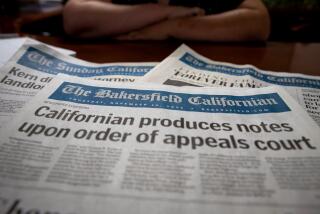Writers Can’t Recklessly Alter Quotes, High Court Says
- Share via
WASHINGTON — The Supreme Court on Thursday revived a $10-million libel suit against author Janet Malcolm and New Yorker magazine, ruling that a writer who “deliberately or recklessly altered” a quotation so as to change the meaning of what the speaker said can be forced to pay damages.
However, the high court said writers and reporters may not be punished for “minor inaccuracies” or even a deliberate rewording that does not “result in a material change in the meaning” of what was said.
Conversations cannot “be reconstructed with complete accuracy,” Justice Anthony M. Kennedy wrote for the court.
The unanimous ruling sends the highly publicized libel case to trial in San Francisco. Libel experts said the decision does not appear to change current law. Press lawyers expressed relief that the conservative court did not use this case to cut back on constitutional protections for authors and journalists.
“This decision sets a reasonable middle ground,” said Rodney Smolla, a libel expert at the College of William and Mary in Virginia. “It gives plenty of breathing space to journalists and nonfiction writers.”
In an unflattering 1983 profile of psychoanalyst Jeffrey M. Masson, Malcolm quoted him as calling himself, among other things, an “intellectual gigolo” and “the greatest analyst who ever lived.”
Those comments did not appear on 40 hours of taped interviews, and Masson denies saying them, although Malcolm says they are in her notes.
As the case (Masson vs. Malcolm and the New Yorker, 89-1799) moved through the courts, it drew wide attention to a rarely discussed question: What is the significance of quote marks surrounding words that appear in newspapers, magazines or books?
For writers as well as readers, quoted words are thought to be the exact words used by a subject. In most news organizations, a reporter can be fired for making up a quote.
However, because of hurried note-taking or the need to compress a long interview into a few words, quoted passages often contain inaccuracies. In addition, writers sometimes clean up a speaker’s words so they read grammatically.
In dismissing Masson’s complaint prior to a trial, federal courts in California had appeared to condone the practice of putting words in a speaker’s mouth. In its 2-1 ruling in favor of the author, an appeals court said the psychoanalyst may not have called himself an “intellectual gigolo” but the phrase nonetheless was a “rational interpretation” of how Masson described himself.
In dissent, Judge Alex Kozinski called this ruling a “right to lie in print.” Much of the press took the same view. Time magazine labeled the author’s legal victory: “The Right to Fake Quotes.”
On Thursday, all nine justices of the Supreme Court voted to reverse the appeals court decision.
Writers who falsely quote subjects in a way that makes them look foolish or harms their reputations are not shielded from paying libel damages, the court said.
The landmark New York Times vs. Sullivan ruling of 1964 gave the press a shield from libel judgments for honest mistakes made in reporting the news, Kennedy said. But that ruling does not “give journalists the freedom to place statements in their subjects’ mouths without fear of liability.”
“By eliminating any method of distinguishing between the statements of the subject and the interpretation of the author, we would diminish to a great degree the trustworthiness of the printed words and eliminate the real meaning of quotations,” he added.
Justice Byron R. White dissented, in part, calling the majority opinion too lenient on misquotations. “The reporter may lie a little, but not too much,” said White, whose dissent was joined by Antonin Scalia.
Both sides found something to like in the ruling.
“We’re elated. I’m confident we’re going to win before a jury,” said San Francisco attorney Charles O. Morgan Jr., who represents Masson. He said the psychoanalyst, who now lives in Berkeley, cannot get a teaching job because of harm that the New Yorker article did to his reputation.
In a statement issued by the New Yorker, the magazine’s attorneys said they looked forward to defending Malcolm. “No quotations were made up by Janet Malcolm. We know this from her tape recordings, from her notes and from her history of personal integrity,” the statement said.
Bruce Sanford, a Washington attorney who represents the news media in libel cases, doubted that the ruling would lead to more lawsuits involving alleged misquotations.
“We’re relieved for what this decision does not do. It is a very measured, very restrained opinion,” he said. “Thankfully, reporters can still clean up my grammar and syntax with impunity.”
More to Read
Sign up for our Book Club newsletter
Get the latest news, events and more from the Los Angeles Times Book Club, and help us get L.A. reading and talking.
You may occasionally receive promotional content from the Los Angeles Times.










